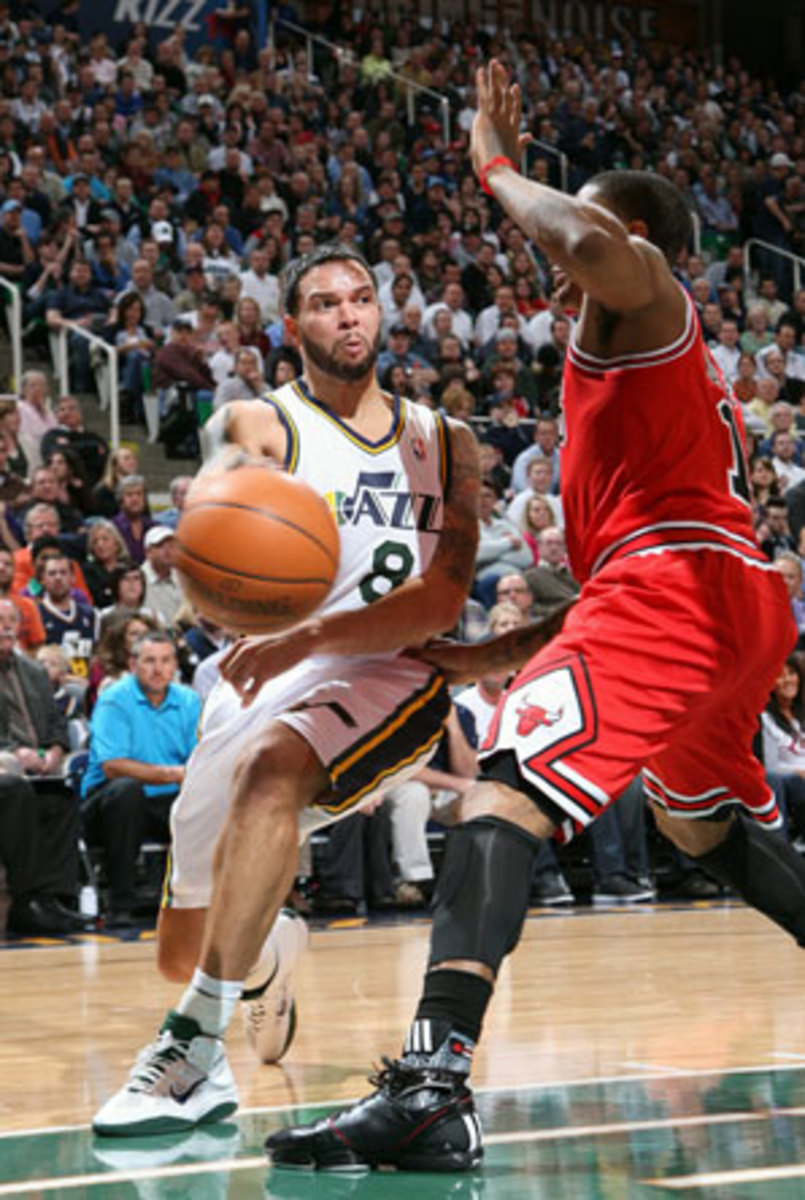Despite elite game, Williams is more famous for dustup with Sloan


The play is called "22," and when the Utah Jazz run it, they always start on the left side of the court. But against the Chicago Bulls on Feb. 9, when Jerry Sloan signaled for 22, Deron Williams decided to start on the right side instead. "That was it," Williams said, and while nobody is implying that one play in the middle of a regular-season game precipitated the departure of a Hall of Fame coach and an All-Star point guard, it was the final act in a team's undoing.
When Sloan retired two weeks ago, after 23 years on the job, he did not provide a substantive answer as to why. He came off as another decorated coach who lost a power struggle with a superstar, and the Jazz another spineless organization caving to the whims of a soon-to-be free agent. That was the easy explanation, but the Jazz have never been a typical franchise, and now it is clear they were not choosing Williams over Sloan at all.
The depth of the rift between Williams and Sloan may never be fully understood, but in Utah, Williams was always going to be perceived as the strong-arm who pushed Sloan out the door. In many markets, that would not be a problem, but Sloan was the face of the Jazz more than any individual player, regardless of that player's performance. If Williams was in any way part of the reason Sloan left, then Williams would have to go, too. This is the rare case of an organization choosing a coach over a player, and rarer still, a coach who doesn't even work for it anymore.
The Jazz sent Williams to New Jersey on Wednesday for a package that includes Derrick Favors, Devin Harris and two potentially high first-round picks. The bounty is similar to what the Nets were offering Denver for Carmelo Anthony, and although Anthony is a bigger name than Williams, he is by no means a better player. For all the dazzling point guards in the NBA, Williams is one of the few who does it all. He is a durable 20-point-per-game scorer who averages nearly 10 assists and shoots better than 35 percent for his career from three-point range.
Until this month, that's pretty much all anybody knew about him. In high school, Williams was overshadowed by blue-chipper Bracey Wright. In college, at Illinois, it was Dee Brown. In Utah, it was Carlos Boozer. But on Feb. 9, Williams became famous for the wrong reasons. He said his halftime argument with Sloan was no different from countless other arguments had by countless other players, but the consequences were clearly different, because Sloan resigned the next day. When Williams showed up to his All-Star media availability session last Friday in Los Angeles, he found himself under a lot more attention than all those years that he was quietly putting up 20/10s.
"If I could go back to being regular, I would," Williams said.
In light of Anthony's politicking and Blake Griffin's car-jumping, Williams' session at All-Star weekend didn't make many headlines. But he said a great deal:
• On his relationship with Sloan: "I wish we had a better one. I wish we talked more. We're similar. We're both stubborn and that cost us in our relationship."
• On this season, in which he has been hampered by a sprained wrist and the Jazz have fallen to eighth in the Western Conference: "I've never had a season this frustrating, as an individual or as a team. ... I lack confidence right now in my game."
• On his potential free agency in 2012: "I'm not going to do The Decision. I don't think anybody would tune in anyway. ... There are so many things that weigh into free agency. You can guess if you want to, but you won't know from me."
The last comment might have been the most revealing. He could have given the Jazz a nod -- not a commitment, of course, but some encouraging words -- and he declined. Between his coy approach to the future, and his role in Sloan's self-imposed exile, there was a strong chance that that the environment around Williams would grow toxic. The Jazz traded him the way most teams fire coaches, as a kind of preemptive strike, before touching bottom. They saw what the Nets were willing to give the Nuggets for Anthony and decided the framework was enough for Williams, too.
The Salt Lake Tribune reported that Williams is unhappy with the trade, which could mean he was more willing than the Jazz to stick out a difficult situation, or that he simply does not want to play in New Jersey. Of course, Jason Kidd also did not want to be in Jersey when the Suns sent him there in 2001 and he led the Nets to two NBA Finals. Before signing an extension with the Nets, Williams will have to believe he can deliver the same kind of results as Kidd.
Teams like the Nets are constantly revamping. The Jazz, on the other hand, are among the most stable entities in sports. Generations grow up with the same coaches and point guards, from John Stockton to Williams, running the Sloan pick-and-roll. This has been a fortnight unlike any other in Utah, the coach gone and now the point guard, a proud franchise moving on with its integrity intact and not much else.
